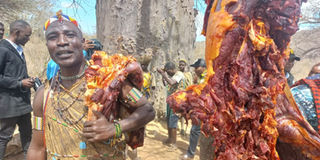Hadzabe given wildebeest meat incentive to be counted

What you need to know:
- This is not the first time for Hadzabe community to ask for the Bushmeat so they can participate in national census. In the 2012 PHC they asked for bush meat and marijuana
Babati. As the national Population and Housing Census (PHC), kicked off on August 23, with citizens waiting to be counted at their residents the exercise has been different for Hadzabe community in Manyara Region.
The Hadzabe live in the Yaeda Valley in Mbulu District whose livelihood depend collecting tubers and fruits had to be given 20 Wildebeest for them to be counted in ongoing national census.
This is not the first time for Hadzabe community to ask for the Bushmeat so they can participate in national census. In the 2012 PHC they asked for bush meat and marijuana.
However, they were only given bush meat because the country's laws does not allow farming and distribution of marijuana.
Speaking on August 23, Manyara Regional Commissioner Makongo Nyerere called on Hadzabe to participate in census to help government to know the number of its citizens and plans of developmental issues.
“We have heard of that you are hunters and on August 23 (today) you will be hunting as usual, so we have decided to hunt for you 20 Wildebeest for a meal while waiting to be counted,” said Makongoro.
For his part a resident of Mongoamano village, Malam Dodokhoye said he will participate in the census exercise although he was disappointed that they were not provided with marijuana per their request.
In the Yaeda Valley of Tanzania, women and children set out to collect tubers, a staple food of the Hadza people.
The Hadza are a modern hunter-gatherer people living in northern Tanzania.
They are considered one of the last hunter-gatherer tribes in Africa with approximately 1,300 tribe members down from about 5,000 in 1990s.
. Their native homeland includes the Eyasi Valley and nearby hills.
The Hadza remain an important study focus for anthropologists, as they represent a modern link to ways of human existence and survival largely abandoned by most of humanity.
As a hunter-gatherer society, the Hadza have no domesticated livestock, nor do they grow or store their own food. The Hadza survive by hunting their food with hand-made bows and arrows and foraging for edible plants. The Hadza diet is primarily plant-based but also consists of meat, fat, and honey. They create temporary shelters of dried grass and branches, and they own few possessions.
They speak a unique language known as Hadzane, which incorporates clicking and popping sounds as well as more familiar sounds. According to their own history, which they preserve through oral tradition, the Hadza have lived in their current environment bordering the Serengeti plains since their first days as a unique group.
This is relatively close to the spot where Homo habilis, one of the earliest hominids, lived 1.9 million years ago. Genetically, the Hadza show one of the oldest lineages of contemporary humans.
Contemporary settlements and farming practices currently threaten the lifestyle of the Hadzabe. They have lost between 75 percent and 90 percent of their land over the past 50 years.





